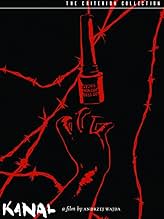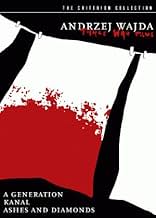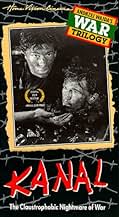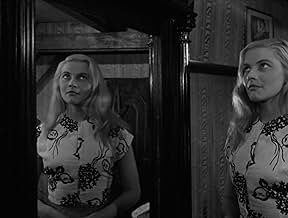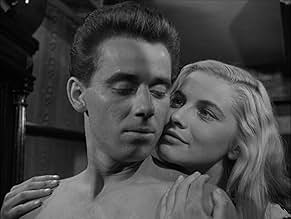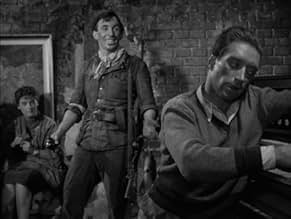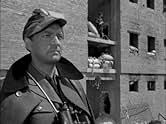IMDb-BEWERTUNG
7,9/10
8461
IHRE BEWERTUNG
1944 nutzen der polnische Leutnant Zadra und seine Widerstandskämpfer während des Warschauer Aufstands gegen die Nazis die Kanalisation Warschaus, um der Einkesselung durch die Deutschen zu ... Alles lesen1944 nutzen der polnische Leutnant Zadra und seine Widerstandskämpfer während des Warschauer Aufstands gegen die Nazis die Kanalisation Warschaus, um der Einkesselung durch die Deutschen zu entfliehen.1944 nutzen der polnische Leutnant Zadra und seine Widerstandskämpfer während des Warschauer Aufstands gegen die Nazis die Kanalisation Warschaus, um der Einkesselung durch die Deutschen zu entfliehen.
- Nominiert für 1 BAFTA Award
- 1 Gewinn & 2 Nominierungen insgesamt
Vladek Sheybal
- Composer Michal
- (as Wladyslaw Sheybal)
Wlodzimierz Bednarski
- Insurgent
- (Nicht genannt)
Zenon Dadajewski
- Insurgent
- (Nicht genannt)
Empfohlene Bewertungen
I think everyone who saw this film knows that it's a masterpiece, but maybe not everyone knows how authentic the film is. The writer of the screenplay - Jerzy Stefan Stawinski - is in fact the Lieutenant Zadra responsible for his platoon. Stawinski wrote down his own war experiences here with impressing honesty.
Another thing that may be interesting in this film is the main female character - Daisy. She isn't supposed to be a superwoman as some suggested. In fact there were several thousands of women fighting in this uprising. All of them that survived it were given the status of soldiers by Germans. It was the first time in the world's history when women received such a status. During the uprising many of them were carrying mail via sewers, so Daisy is rather a typical character in this role. It would be more surprising if the guide was a man.
Another thing that may be interesting in this film is the main female character - Daisy. She isn't supposed to be a superwoman as some suggested. In fact there were several thousands of women fighting in this uprising. All of them that survived it were given the status of soldiers by Germans. It was the first time in the world's history when women received such a status. During the uprising many of them were carrying mail via sewers, so Daisy is rather a typical character in this role. It would be more surprising if the guide was a man.
This is an excellent movie. It tells the story of the last stages of the Warsaw Uprising against the Nazis. A small unit of Polish Resistance fighters are ordered to fall back to a central position by going through the sewers.
Most of the actions happens in the eerie confines of the sewers, which creates a very gripping atmosphere. However, the most interesting aspect of the movie is the character development. All of the characters are so different and changeable. No stereotypical characters in this movie!
Andrzej Wajda is a truly great director. He is able to make unique movies based on the character development, rather than relying on gimmicks to gain the audience's attention. In this movie you never know what is ultimately going to happen to the resistance fighters until the final scenes.
Most of the actions happens in the eerie confines of the sewers, which creates a very gripping atmosphere. However, the most interesting aspect of the movie is the character development. All of the characters are so different and changeable. No stereotypical characters in this movie!
Andrzej Wajda is a truly great director. He is able to make unique movies based on the character development, rather than relying on gimmicks to gain the audience's attention. In this movie you never know what is ultimately going to happen to the resistance fighters until the final scenes.
Watching Andrzei Wajda's war movie 'Kanal' one is stuck just by how short the interval was between the making of this film and the horrors it depicts. And while there were plenty of British and American war films made in the 1950s, it was perhaps easier to turn "our" story into the black-and-white banality of heroic fable, besides which, "we" could also make movies without communist censors looking over our shoulders. Wajda here chooses to fashion a tale centred on the collapse of the Polish resistance to the Nazis: the last survivors take to the sewers, the Germans pump gas down, and you know as soon as the film starts that there will be no happy endings, even for the survivors. It's a tale whose laconic nihilism would be remarkable in any era: I was reminded of the (much later) BBC nuclear-themed drama 'Threads', another tale of underground life facing extinction, while the dialogue, stoical in the face of impossible fate, offers more direct echos, for it made me think of the films of another Polish master, Krystoff Kieslowski. The most remarkable things in this film are the poetically bleak sequence of scenes that end it; it's biggest failing is the score, that (as with many films of this era) feels the need to describe the plot, and not merely to complement it. Occasionally other aspects of the movie also give away its age, but what's much more notable is the modernity (and hopelessness) of its approach to its material. A fine achievement, dating from an era when the events it portrayed were the present, not the past.
"Kanal" (Polish, 1957): This is the second of Andrzej Wajda's trilogy about WWII in Poland. I love the photography the light, the angles, the flowing camera movements. "Kanal" is about a group of resistance fighters and civilians who, out of necessity, band together to fight (what appears to be a losing battle) against the oncoming Nazis. First set in an incredibly bleak ruin of Warsaw, the story and acting only intensify as they begrudgingly try to escape through the underground sewer system. This one will take it out of you. It is relentless. It is relentless. It is relentless. It is relentless. Relentless. Relentless. Relentless. Relentless. Relentless. Relentless.
10begger
In many respects this movie is sheer brilliance. For starters "Kanal" describes the entire Polish Revolt in a single instance at the eve of its termination. But this movie is much more than a parable of Revolution and struggle. "Kanal" has great characters, great settings, great scenes, and, above all, an important message to be told.
What would it be like to fight an impossible battle against a larger force and be in the real world? What would it be like to face death at every turn and still travel on knowing defeat awaited you at the next bend? "Kanal" is the answer to these questions.
What would it be like to fight an impossible battle against a larger force and be in the real world? What would it be like to face death at every turn and still travel on knowing defeat awaited you at the next bend? "Kanal" is the answer to these questions.
Wusstest du schon
- WissenswertesDirector Andrzej Wajda was himself a fighter in the Polish resistance movement against the Nazis in World War II and several scenes in the film were based on his experiences.
- PatzerWhen Korab is attacking Goliath self-propelled tracked mine, a wire pulling it can be seen.
- Zitate
Narrator: These are the tragic heroes: watch them closely in the remaining hours of their lives.
- VerbindungenFeatured in Vieras (1984)
Top-Auswahl
Melde dich zum Bewerten an und greife auf die Watchlist für personalisierte Empfehlungen zu.
- How long is Kanal?Powered by Alexa
Details
- Erscheinungsdatum
- Herkunftsland
- Offizieller Standort
- Sprachen
- Auch bekannt als
- Kanal
- Drehorte
- Produktionsfirma
- Weitere beteiligte Unternehmen bei IMDbPro anzeigen
- Laufzeit1 Stunde 31 Minuten
- Farbe
- Sound-Mix
- Seitenverhältnis
- 1.37 : 1
Zu dieser Seite beitragen
Bearbeitung vorschlagen oder fehlenden Inhalt hinzufügen


